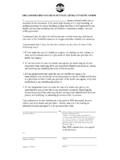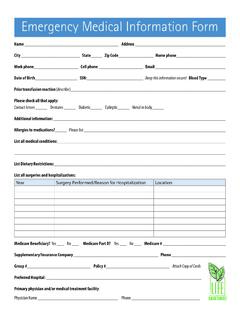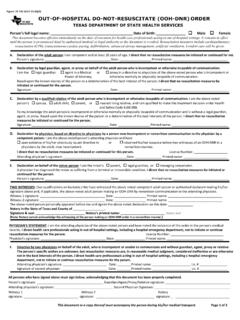Transcription of Do Not Resuscitate Orders (DNR) - Neighborhood Legal …
1 Do Not Resuscitate Orders (DNR) 2012 Neighborhood Legal Services Inc., Family Unit Updated: 7/2012 Page 1 of 2 237 Main Street, Suite 400 Buffalo, New York 14203 Phone: Fax: Web: What is a Do Not Resuscitate order (DNR)? A Do Not Resuscitate order (DNR) is an advance direction that you make saying that cardio-pulmonary resuscitation (CPR) is not to be administered to you. Doctors, nurses and emergency medical personnel will not attempt emergency CPR if your breathing or heart stops. What is Cardio-pulmonary Resuscitation (CPR)? Cardio-pulmonary resuscitation (CPR) refers to the medical procedures used to restart a person s heart and breathing when they suffer heart failure. CPR may involve simple efforts such as mouth-to-mouth resuscitation and external chest compression.
2 It may also involve electric shock, insertion of a tube to open the patient s airway, injection of medication into the heart and in extreme cases, the opening of your chest to manually massage your heart. Who can consent to having a DNR in place? If you are 18 years of age or older and have capacity to make decisions yourself, you can consent to a DNR verbally or in writing. If you lack capacity and did not tell your doctor your wishes in advance, a surrogate under the Family Health Care Decisions Act (FHCDA) can give consent. Under what circumstances can a family member or close friend decide that a DNR order should be in place? A family member or close friend can consent to a DNR order only when you are unable to decide for yourself and you have not appointed someone to decide for you under a health care proxy document.
3 Your family member or close friend can consent to a DNR order when: a) You are terminally ill; or b) You are permanently unconscious; or c) CPR will not work (would be medically futile); or d) CPR would impose an extraordinary burden on you given your medical condition and the expected outcome of CPR. Anyone deciding for you must base their decision on your wishes, including your religious and moral beliefs. If your wishes are not known, then in your best interests. What if members of my family disagree? In a hospital or nursing home, your family can ask that the disagreement be mediated. Your doctor can request mediation if he or she is aware of any disagreement among your family members. Are there different types of DNRs? Yes. There are two types of DNRs: a) hospital and b) non-hospital.
4 What is a hospital DNR? Under a hospital DNR , the physician issues the DNR when you are in the hospital or a nursing home after you or your surrogate have given verbal or written consent to having a DNR in place. If verbal consent was given, it must be witnessed by 2 adults, 1 of whom must be a doctor in the facility where you are admitted. If written consent was given, it must be 2012 Neighborhood Legal Services Inc., Family Unit Updated: 7/2012 Page 2 of 2 237 Main Street, Suite 400 Buffalo, New York 14203 Phone: Fax: Web: signed by 2 adult witnesses. This type of DNR does not expire while you are in the hospital or the nursing home. It must, however, be regularly reviewed by your physician with you or your surrogate. What is a non-hospital DNR?
5 A non-hospital DNR is issued when you are at home and have given verbal consent to your physician to having a DNR in place. It can also be issued while you are in the hospital or a nursing home to take effect after you are discharged home. You can also give written consent signed by 2 adult witnesses. In either case, the consent must be recorded and signed by your physician. Unlike a hospital DNR that does not expire, a non-hospital DNR must be renewed every 90 days by your physician. What happens to a DNR if I am transferred from a nursing home to a hospital and vice versa? The DNR order will continue until a doctor examines you and decides whether the order should remain or be cancelled. If the doctor decides to cancel the DNR order , you or anyone who decided for you will be told and can ask that the DNR order be entered again.
6 What happens to my hospital DNR order if I am transferred from the hospital or nursing home back to my home? The hospital DNR order will not apply at home. If you leave a hospital or nursing home without a DNR order , a non-hospital DNR order can be issued by a doctor for you at home. If I am at home with a DNR order , what happens if a family member or friend calls 911? If you have a non-hospital DNR order and family member show it to emergency personnel, they will not try to Resuscitate you or take you to a hospital emergency room for CPR. Is my right to request or receive other treatment affected by a DNR order ? No. A DNR order is only a decision about CPR and does not relate to any other medical treatment. If I request a DNR order , must my doctor honor my wishes? If you don t want CPR and you request a DNR order , your doctor must follow your wishes or: a) Transfer your care to another doctor who will follow your wishes; or b) Begin a process to settle the dispute if you are in a hospital or a nursing home.
7 If the dispute is not resolved within 72 hours, your doctor must enter the order or transfer you to the care of another doctor. What if I change my mind and I no longer want a DNR. Can I have it revoked? Yes. You or anyone who consents to a DNR order on your behalf can remove the order by telling your doctors, nurses or others about the decision. This does not have to be done in writing but can be made verbally. Once informed of your wishes, your physician must record the DNR revocation in your chart, cancel the DNR order and make diligent efforts to retrieve all copies of your DNR form.











